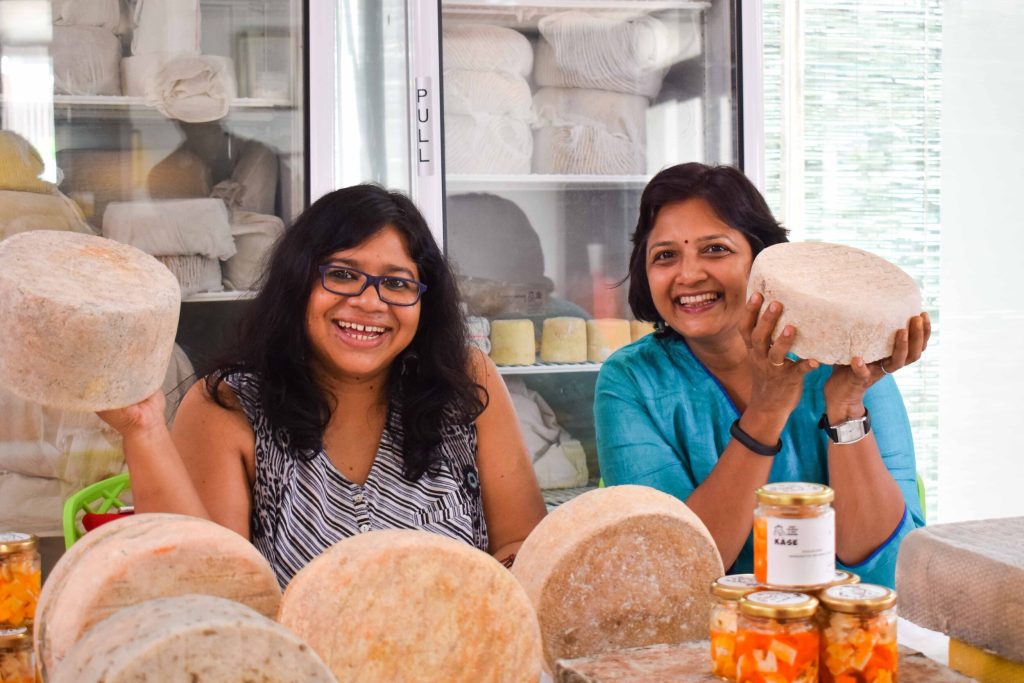Pranav Varshney, Chennai

Image Source: GOYA.in
In India, where per capita cheese consumption is only 300-500 grams annually compared to France’s 27 kilograms, Käse Cheese, based in Chennai, is working to develop the country’s artisanal cheese market. According to co-founder Namrata Sundaresan, Käse aims to change this perception by introducing high-quality cheeses tailored to Indian tastes.
Founded in 2016 by Anuradha Krishnamoorthy and Namrata Sundaresan, Käse—German for “cheese”—began with locally sourced milk. “We started making cheese with Avin milk,” Krishnamoorthy explained during a recent interview, describing their initial production efforts that relied on local dairy suppliers.
The company now produces over 40 varieties of fresh and aged cheeses, all crafted without preservatives or artificial ingredients. These cheeses contain 35 percent protein, making them a healthier alternative to processed options, noted Sundaresan. Käse’s products are distributed across major Indian cities.
“The biggest challenge is to convince people,” Sundaresan remarked, highlighting the need for market education in a country where cheese is not a staple food. Despite this challenge, Käse has established a balanced revenue model with 50 percent of sales coming from direct-to-consumer channels and the other 50 percent from business-to-business partnerships, including luxury hotel chains like Oberoi.
Käse’s supply chain extends to pastoral communities across India. The company collaborates with 60 families in Gujarat and partners with 30 pastoral communities nationwide. This initiative creates economic opportunities for traditional dairy producers, Sundaresan explained. Additionally, their commitment to sustainability includes repurposing production byproducts. “The whey ricotta is supplied to bakers,” Krishnamoorthy added.
The company’s pricing reflects its premium positioning. Business-to-business units weigh between 150-200 grams, while retail pricing ranges from ₹3,000 to ₹5,000 per kilogram. Käse also offers a monthly subscription service delivering customized cheese boxes directly to consumers’ homes.
Käse differentiates itself through regional flavor profiles. “We offer varieties like ‘Ode to Chennai,’ which uses a cheddar technique but is aged with a spicy milagai podi rub,” Sundaresan elaborated. This fusion of traditional cheesemaking techniques with Indian ingredients sets Käse apart from competitors.
The company’s products have earned widespread recognition. Käse won the ‘Taste of the Market’ award at Karen Anand’s farmers market in Chennai. Chef Bani Nanda from Delhi described Käse as her “favorite Indian fromagerie,” while food critic Karen Anand praised their products as “Really some of the best cheese in India.”
Beyond commercial operations, Käse maintains a strong social mission by employing and training differently abled women in the art of cheesemaking. This initiative provides sustainable livelihoods while fostering workforce inclusion in food production.
India’s cheese market is growing quickly as more people want to try western foods and healthier options. According to a report by IMARC Group published in January 2024, the market was worth ₹107.54 billion in 2024 and is expected to reach ₹593.47 billion by 2033, with an annual growth rate of about 19.86%. Quick-service restaurants, like pizza chains and cafes, are increasing cheese use in their menus, which helps boost demand. Additionally, urban consumers are showing interest in artisanal cheeses, which are often made locally and offer unique flavors. For example, Käse Cheese has gained popularity for its innovative products that cater to this growing interest.
Additionally, Aakriti Srivastava, founder of Bahula Naturals, commented during a panel discussion on artisanal food trends in Mumbai in July 2024 that “the artisanal cheese segment is experiencing double-digit growth as urban consumers increasingly seek gourmet products that emphasize local terroir and unique flavor profiles.” She attributed this trend to upward mobility among urban populations and their willingness to experiment with high-quality cheeses.
Looking ahead, Käse plans to expand its pastoral cheese program and increase production capacity while maintaining its commitment to quality and social impact. “We see our cheese as terroir-inspired,” Sundaresan stated, emphasizing how their products reflect the distinct characteristics of India’s diverse dairy ecosystems.
